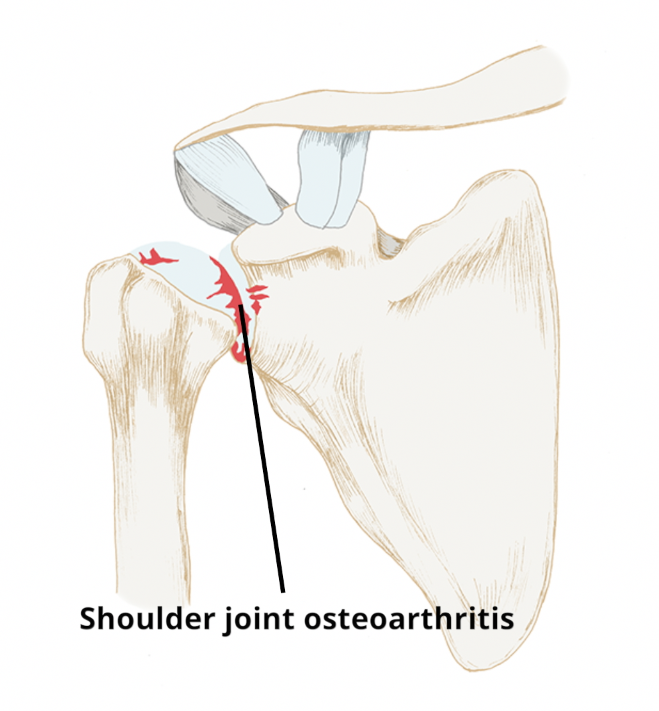 Shoulder joint osteoarthritis is the name given to pain and stiffness in the shoulder as a result of osteoarthritis.
Shoulder joint osteoarthritis is the name given to pain and stiffness in the shoulder as a result of osteoarthritis.
Osteoarthritis involves wearing or thinning of the smooth cartilage joint surfaces as well as stiffening to the soft tissue surrounding the joint. These aspects combine to produce swelling, inflammation and pain.
Several factors normally combine to cause symptoms of osteoarthritis:
- Previous joint damage (from trauma or other conditions such as rheumatoid arthritis)
- Age (risk increases with age)
- Family history (genetics)
As it is not a weight-bearing joint, significant shoulder osteoarthritis often develops in individuals who have sustained previous trauma to the joint or who have been involved with repetitive manual overhead work.
How is shoulder osteoarthritis treated?
Non-surgical management
Modifying activity
As the condition is often triggered by movement, activity modification and avoidance of aggravating activities is important.
Exercises. In the majority of cases, shoulder osteoarthritis can be managed effectively by following a regular exercise routine to maintain flexibility and strength to the affected shoulder joint:
These are suggested exercises only. If you are at all concerned about whether these exercises are suitable for you or if you experience any pain while doing them, please seek appropriate clinical advice from your GP or Physiotherapist.
Using painkillers when needed. Over-the-counter analgesia is available through pharmacies when needed. Paracetamol is most commonly prescribed. Anti-inflammatories, such as Ibuprofen, are also used, but as there is little or no inflammation involved in osteoarthritis these are best avoided without discussing with your GP. Side effects are even more common than with paracetamol so please ensure to take appropriate medical advice. There is a good booklet on the Arthritis Research UK website with information about the various drug options.
Corticosteroid injection therapy. For individuals with shoulder joint osteoarthritis who continue to suffer disabling symptoms in spite a course of non-surgical management (outlined above) or for patients who are unable to commence a supervised exercise program due to pain levels, a corticosteroid injection can be offered. You can read more about local corticosteroid injections here.
Surgical management
Total shoulder replacement surgery can be an option for patients with advanced shoulder osteoarthritis. It is, however, a major operation with a prolonged period of rehabilitation and is not always successful. It requires careful patient selection by the surgeon to obtain best results.
It may be considered in patients who:
- Have trialled a course of non-surgical management for 6 months without success
- Have consistent, disabling pain significantly limiting mobility and/ or affecting sleep pattern
You may be asked to complete a shoulder questionnaire. This can help the clinician assess the impact of your symptoms which can be useful in assessing suitability for surgery.